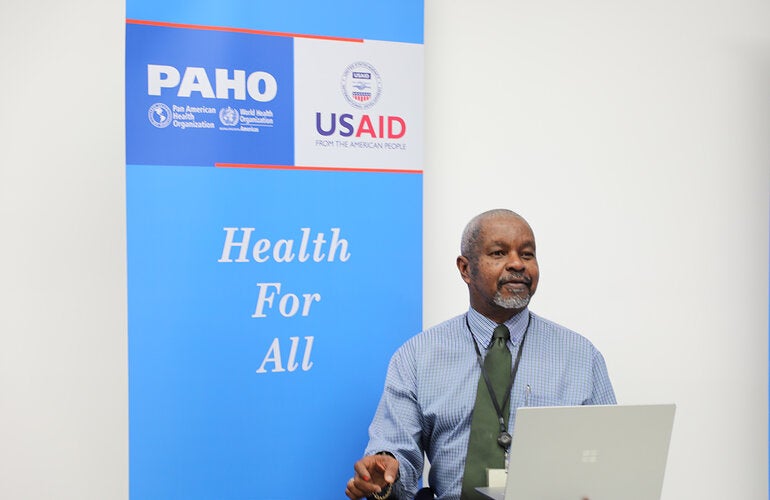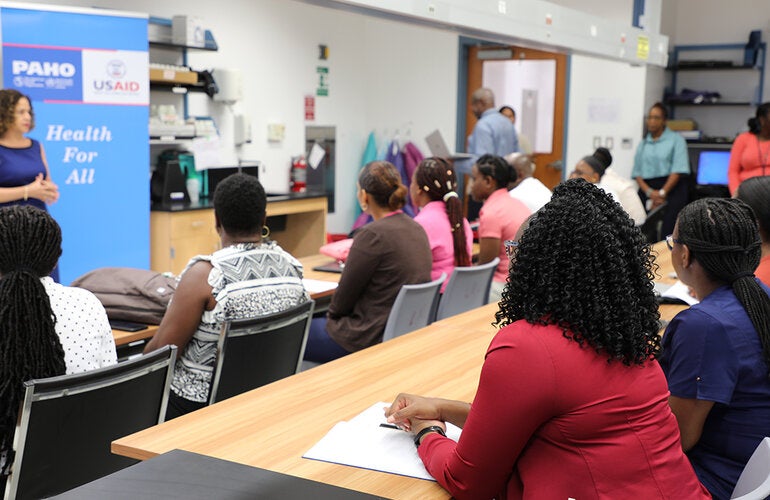
Bridgetown, Barbados, 05 July 2023 (PAHO/WHO) - Biosafety Officers from Barbados and the Eastern Caribbean Countries (ECC) convened at the Best Dos Santos Public Health Laboratory in Barbados on 20 June 2023, for a 4-day training on laboratory biosafety and biosecurity programme management.
The need for this training and mentorship of laboratory personnel was identified among key recommendations of a gap analysis on biosafety and biosecurity practices conducted in the ECC in 2022. It will support countries’ efforts in implementing laboratory related core capacities of the International Health Regulations (IHR) and aligns with requirements for health systems strengthening.
PAHO/WHO Representative for Barbados and the Eastern Caribbean Countries, Dr. Amalia Del Riego expressed appreciation to the Government of Barbados, the Best Dos Santos Laboratory and USAID for facilitating the training. She explained to participants that the strengthening of laboratory services is one of the mandates of PAHO member states.
Dr. Kenneth George, Chief Medical Officer, Ministry of Health and Wellness Barbados, informed that having appropriate biosafety measures in place at an institutional, laboratory and national levels, are important to maintain preparedness and ability to execute an adequate response plan as described in the indicators of the IHR.
Sacha Wallace-Sankarsingh, PAHO Consultant, was the training instructor with guest lectures from subject matter experts from PAHO/WHO, the UN Biological Weapons Convention Implementation Support Unit (BWC-ISU), Caribbean MedLabs Foundations (CMLF) and the International Federation of Biosafety Associations (IFBA).
The training was facilitated by PAHO/WHO with the funding of USAID.
Participant Testimonials
Ms. Andrea Williams, Medical Technologist, JN France Hospital Laboratory, St. Kitts
“This was my first Biosafety & Biosecurity Training. I must say, it was a good experience that I think all healthcare personnel should be exposed to.
The format, tools and materials provided were easy to use and will assist in helping institutions conform to what is expected of them according to international standards.
I would recommend such a training to others as it demonstrates and cements, what we do and why it is done.
Good job”
Mr. Craig Neil Henry, Laboratory Technologist/Safety Officer, National Medical Laboratory, Dominica
“I am very appreciative of the opportunity to participate in the 2023 ECC Biosafety Officers Training under the auspices of PAHO. This training session was very timely since I was recently presented with the chance to operate in the capacity of Safety Officer at the Dominica National Medical Laboratory. I embraced the opportunity to function as Safety Officer without much prior knowledge.
Thanks to the training sessions organized by PAHO I feel equipped with knowledge to disseminate and can confidently apply biosafety and biosecurity best practices at my place of work.”
Ms. Portia Charles, Quality Manager, National Medical Laboratory, Grenada
“I am very appreciative for having been given the opportunity to attend the ECC Laboratory Biosafety Officers Training. Not only was a wealth of knowledge shared, but we were also taught how and where we can access complimentary information. Sacha did an excellent job at facilitating the workshop.
I also learnt quite a bit from my fellow participants during discussions. I feel so motivated to work towards implementing what I learnt. I know, and as Sacha emphasized, it cannot be done all at once but eventually with the knowledge gathered my colleague and I will be able to bring our lab a long way from where it presently is in relation to biosafety. Thank you!”
Mr. Haze John, Senior Medical Technologist and Safety Officer, Milton Cato Memorial Hospital Laboratory, St. Vincent and the Grenadines
“This Biosafety training was a timely one. A safe laboratory working environment is of paramount importance for the Ministry of Health, Wellness and the Environment of Saint Vincent and the Grenadines. This biosafety training has helped to impart the necessary knowledge and skills for us to function effectively as Biosafety officers in our respective laboratories. Allowing us to provide management with the appropriate information, so we can all work in a safe environment.
It has also helped in the area of risk assessment, which is very important for laboratory’s work. The training was based on current and update biosafety international standards and manual. As a result, I am feeling confident to discharge my responsibilities as a Biosafety officer.”






